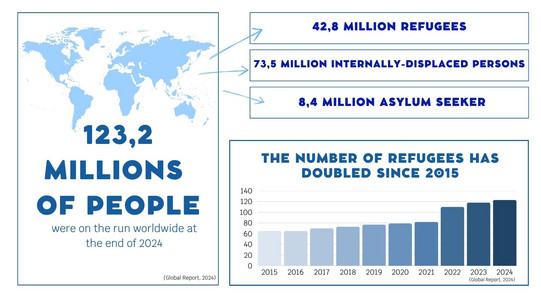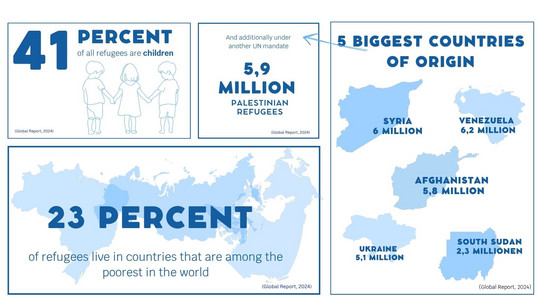World Refugee Day
Facts and data on refugees
Never before have so many people been forced to leave their homes. The number of refugees has been rising for years; according to the UNHCR, 1.5% of the world's population is displaced. Compared to 2010, the absolute number of people has even doubled (UNHCR 2024). In mid-2024, there were around 73 million displaced persons who had to flee from conflict and violence within their own country and around 42 million refugees who had to leave their country of nationality and now live in another country. There they are entitled to special rights and protection under the Geneva Refugee Convention. They are protected by the UNHCR mandate of the UN General Assembly. In 2024, a further 8 million people were seeking asylum who had applied for asylum in their country of arrival but whose asylum procedure had not yet been finalised.
The causes of migration and countries of origin are diverse. For example, climate change and the resulting natural disasters are becoming more and more relevant (Aktion Deutschland hilft n.d.). However, most people are fleeing from wars or political and social conflicts. Both existing and newly emerging conflicts play an equally important role. The countries of origin from which the most people fled in 2024 were Venezuela (6.2 million), Syria (6), Afghanistan (5.8), Ukraine (5.1) and South Sudan (2.3). "Many of these refugees have been on the run for many years. The increase in the first half of 2024 is mainly due to the ongoing displacement from Sudan and Ukraine," writes UN Refugee Agency on its website.
In addition, according to the Global Report 2024, 5.9 million Palestinians (UNHCR 2024) were displaced. The UNRWR mandate of the UN General Assembly is responsible for Palestinian refugees in Jordan, Lebanon, Syria, the West Bank and the Gaza Strip and not the UNHCR mandate, which is responsible for the protection of all other international refugees. This differentiation in responsibilities means that Palestinians are included in the overall statistics for all refugees, but not in the lists of the most common countries of origin.
Women and children on the run
Women and children are particularly vulnerable groups of people on forced migration. According to the UNHCRS, 41% of refugees are children. A group that is particularly defenceless and therefore exposed to a high degree of violence and arbitrariness (UNHCR 2024). Half of the refugees are women and girls (UNHCR 2024). Most women flee for the same reasons as men: wars, political persecution, poverty, human rights violations, hunger or climate disasters.
However, there is also gender-specific violence to which women and girls are exposed. This includes, for example, genital mutilation, forced sterilisation or marriage, human trafficking, sexism and discrimination, such as the denial of the right to education or work (Krämer & Scherschel 2018). Rape and sexualised violence are also forms of gender-specific violence that are used as a strategic weapon of warfare in many conflicts and which in most cases affect women and girls (Krämer & Scherschel 2018).
In addition, refugee women often lack basic financial resources - for example due to a lack of work in their home country - which is why many decide to flee within their own country rather than undertaking long and risky journeys (Krämer & Scherschel 2018). Women in particular are also exposed to ongoing discrimination, oppression and threats during or even after their migration, for example in reception centres (Krämer & Scherschel 2018).
Current tightening of asylum policy
In order to counter gender-based violence and ensure the protection of women refugees worldwide, more gender-sensitive perspectives need to be adopted and more attention needs to be paid to gender-specific causes of flight and the dangers of flight. In addition, existing guidelines, such as the Istanbul Convention, should be enforced more consistently and new guidelines drafted. This is currently not happening.
In 2018, sociologists Anna Krämer and Karin Scherschel wrote in their text „Frauen auf der Flucht“: “The current European asylum policy focuses on preventing migration movements and, in its current form, contributes to worsening the situation of women.”
This is done by deporting them to unsafe countries, closing off legal escape routes, which forces women to take risky routes, or by obligatory accommodation in initial reception camps, which often offer little to no gender-sensitive infrastructure.
The CEAS reform (reform of the Common European Asylum System) introduced in May 2024 has further aggravated the situation for all refugees at European borders: Among other things, the CEAS is intended to speed up asylum procedures and expand border protection at the EU's borders as well as asylum centers. Although the latter are built on EU territory, refugees are not considered to have entered the country (bpb 2024). Several human rights organizations criticize the CEAS reform as inhumane and as an expansion of “Fortress Europe” (Pro Asyl 2024).
The network UNITED for Intercultural Action has documented and published a list of “deaths of refugees and migrants due to the restrictive policy of ‘Fortress Europe’” every year since 1993. In mid-2025, the network counted more than 66,500 people who drowned, were murdered or took their own lives during or after their migration as a result of asylum policy (UNITED 2025).
Last updated: June 2025
Sources (in German)
- Aktion Deutschland Hilft (n. d.): Weltflüchtlingstag am 20. Juni. Last accessed 12.06.2025.
- Bundeszentrale für politische Bildung (bpb) (2024): Reform des Gemeinsamen Europäischen Asylsystems. Last accessed 17.06.2025.
- Krämer, A. & Scherschel, K. (2018): Frauen auf der Flucht. Bundeszentrale für politische Bildung. Last accessed 12.06.2025.
- The Global Refugee Agency (UNHCR) (2024): Global Trends.
- UNHCR (1951): Abkommen über die Rechtsstellung der Flüchtlinge vom 28. Juli 1951.
- UNITED (2025): List of 66.519 documented deaths of refugees and migrants due tot he restrictive policies of ‚Fortress Europe‘. Last accessed 17.06.2025.
- UNO Flüchtlingshilfe (n. d.): Flüchtlingszahlen. Last accessed 17.06.2025.
- UNO Flüchtlingshilfe (n. d.): Besondere Bedürfnisse von Flüchtlingsfrauen. Letzter Zugriff 12.06.2025.
- Pro Asyl (2024): FAQ zur europäischen Asylreform GEAS: Antworten auf die wichtigsten Fragen. Last accessed 17.06.2025







